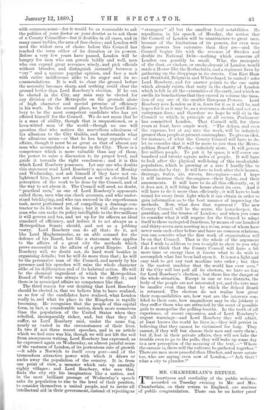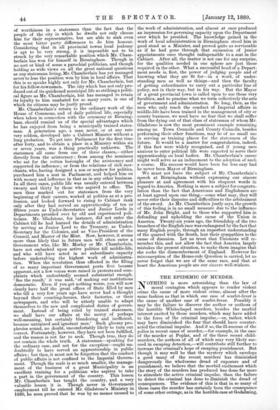MR. CHAMBERLAIN'S RETURN.
THE heartiness and cordiality of the public welcome accorded on Tuesday evening to Mr. and Mrs. Chamberlain, on their return to England, are matters of public congratulation. There can be no better proof of worthiness in a statesman than the fact that the people of the city in which he dwells not only choose him for their representative, but are able to sink even the most bitter party differences to do him honour. Considering that in all provincial towns local jealousy the most bitter party differences to do him honour. Considering that in all provincial towns local jealousy in apt to be very strong, it is impossible not to be struck by the very remarkable position which Mr. Cham- berlain has won for himself in Birmingham. Though in no sort or kind of sense a parochial politician, and though holding as wide views on all the great national questions as any statesman living, Mr. Chamberlain has yet managed never to lose the position won by him in local affairs. That this is so speaks highly not only for Mr. Chamberlain, but for his fellow-townsmen. The city which has not only pro- duced out of its quickened municipal life so striking a politi- cal figure as Mr. Chamberlain, but has managed to retain its loyalty to him unabated for so many years, is one of which its citizens may be justly proud. Mr. Chamberlain's return to the ordinary work of the House of Commons, and of daily political life, especially when taken in connection with the ceremony at Birming- ham, should remind us of the special advantages which he has enjoyed from being a municipally trained states- man. A generation ago, a man never, or at any rate very seldom, developed into a Cabinet Minister without a long probation. To get into Parliament for the first time after forty, and to obtain a place in a Ministry within six or seven years, was a thing practically unknown. The statesmen all came from one of three classes,—either directly from the aristocracy ; from among the nominees who sat for the rotten boroughs of the aristocracy and supported its influence ; or from the relations of rich mer- chants, who, having designed a son or nephew for politics, purchased him a seat in Parliament, and helped him on with money and influence in that as in any other business. in all three cases, public life was usually entered between twenty and thirty by those who aspired to office. The men thus marked out for statesmen from the very beginning of their careers, worked at polities as at a pro- fession, and looked forward to rising to Cabinet rank only after they had served an apprenticeship of ten or fifteen years as Under-Secretaries and Junior Lords in Departments presided over by old and experienced poli- ticians. Mr. Gladstone, for instance, did not enter the Cabinet till he had learned the details of administration by serving as Junior Lord to the Treasury, as Under- Secretary for the Colonies, and as Vice-President of the Council, and Master of the Mint. Now, however, it seems more than likely that in future men will often enter a Government who, like Mr. Morley or Mr. Chamberlain, have not embarked upon active politics till middle-life, and who will have acted in no subordinate capacity before undertaking the highest work of administra- tion. When the revolution thus effected in the filling of so many important Government posts first became apparent, not a few voices were raised in protests and com- plaints which undoubtedly seemed substantial enough. See the result,' it was said, of making our institutions democratic. Even if you get nothing worse, you will now clearly have half the great offices of State filled by men who till a very few years ago have never had a thought beyond their counting-houses, their factories, or their newspapers, and who will be utterly unable to adapt themselves to the new and complicated duties of govern- ment. Instead of being ruled by trained statesmen, we shall have our affairs at the mercy of perhaps well-meaning, but certainly blundering and inefficient, because untrained and ignorant men.' Such gloomy pro- phecies sound, no doubt, uncomfortably likely to turn out correct. Fortunately, however, they have not been fulfilled, and the reason is not far to seek. Though true, they do not contain the whole truth. A statesman—speaking for the ordinary case, and not for the exception—ought un- doubtedly to have served an apprenticeship in public affairs ; but then, it must not be forgotten that the conduct of public affairs is not confined to the Imperial Govern- ment. Though the scale is so much smaller, the manage- ment of the business of a great Municipality is an excellent training for a politician who aspires to take a part in the government of the country. This lesson Mr. Chamberlain has taught the country, and. a very valuable lesson it is. Though never in Government employment till he entered Mr. Gladstone's Ministry in 1880, he soon proved that he was by no means unused to the work of administration, and almost at once produced an impression for governing capacity upon the Department over which he presided. The knowledge gained in the work of local administration in Birmingham stood him in good stead as a Minister, and proved quite as serviceable as if he had gone through that succession of junior appointments once thought indispensible to a seat in the Cabinet. After all, the Matter is not one for any surprise, for the qualities needed in one sphere are just those required in the other. What a successful head of a Depart- ment needs is, first, the power of judging people and of knowing what they are fit for—in a word, of under- standing men as well as things—and then the faculty of getting subordinates to carry out a particular line of policy, not in their way, but in his way. But the Mayor of a great provincial town is called. upon to use these very faculties, and to practise what we term collectively the arts of government and administration. So long, then, as the men who only reach the conduct of Imperial affairs in middle-life have been trained in the management of city or county business, we need have no fear that we shall suffer from the dying out of that class of statesman of whom Mr. Gladstone is now the most prominent example remaining among us. Town Councils and County Councils, besides performing their other functions, may be of no small use in serving as training places for the statesmen of the future. It would be a matter for congratulation, indeed, if this fact were widely recognised, and if young men anxious to enter political life were expected to serve their apprenticeship on local bodies. Mr. Chamberlain's career might well serve as an inducement to the adoption of such a course. His success would have been far less easy had he never been Mayor of Birmingham.
We must not leave the subject of Mr. Chamberlain's speech at Birmingham without expressing our sincere pleasure at and agreement with his eloquent words in regard to America. Nothing is more a subject for congratu- lation than the fact that Americans and Englishmen are at least agreed upon one thing,—come what may, they will never refer their disputes and difficulties to the arbitrament of the sword. As Mr. Chamberlain justly says, the growth of this feeling is in no small measure due to the influence of Mr. John Bright, and to those who supported him in defending and upholding the cause of the Union in America. Twenty-six years ago, the friendship of the two branches of the English race was endangered by the fact that many English people, through an imperfect understanding of the quarrel with the South, lent their sympathies to the cause of disunion. Let us trust that Unionists will re- member this, and not allow the fact that America largely mistakes the present situation, to make them imagine that she seeks the dismemberment of England. However far misconception of the Home-rule Question is carried, let us never forget that we are of the same race, and that at heart the American people are our sincere well-wishers.







































 Previous page
Previous page